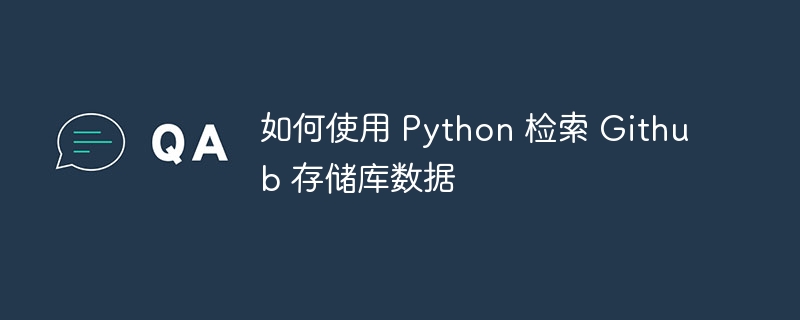如何使用 Python 检索 Github 存储库数据
来源:dev.to
时间:2024-09-30 17:57:52 496浏览 收藏
今日不肯埋头,明日何以抬头!每日一句努力自己的话哈哈~哈喽,今天我将给大家带来一篇《如何使用 Python 检索 Github 存储库数据》,主要内容是讲解等等,感兴趣的朋友可以收藏或者有更好的建议在评论提出,我都会认真看的!大家一起进步,一起学习!

您的组织是否拥有太多 github 存储库,并且您需要一种简单的方法来总结和记录每个存储库的内容以用于报告、仪表板或审计目的?下面是一个使用 github api 完成该操作的快速脚本。
功能:
-
get_repo_info(所有者,回购):
- 获取 github 存储库所有者的用户名 (owner) 和存储库名称 (repo)。
- 向 github 的 api 发送请求以获取存储库信息。
- 如果成功,则以 json 对象的形式返回存储库的信息,如果出现错误,则返回 none。
-
get_collaborators(collaborators_url):
- 获取存储库协作者列表的 url。
- 发送请求以获取协作者列表。
- 返回协作者用户名列表,如果发生错误则返回空列表。
-
get_languages(languages_url):
- 获取存储库语言数据的 url。
- 发送请求以检索存储库中使用的编程语言。
- 返回语言列表,如果出现错误,则返回空列表。
-
get_open_issues(所有者,回购):
- 获取存储库所有者的用户名 (owner) 和存储库名称 (repo)。
- 发送请求以检索存储库中未解决问题的列表。
- 以 json 格式返回未解决的问题,或者如果出现问题则打印错误消息。
-
get_repo_data(repo_url):
- 获取存储库 url,解析它以获取所有者和存储库值,然后调用其他函数来收集有关存储库的各种信息。
- 编译存储库信息,包括其名称、所有者、可见性、协作者、语言、未解决的问题和最后的活动,并以结构化格式(字典)返回。
import json
import requests
from pymongo import MongoClient
# MongoDB setup (replace with your actual connection details)
client = MongoClient("mongodb://localhost:27017/")
db = client["github_repos"] # Database name
collection = db["repos"] # Collection name
def get_repo_info(owner, repo):
url = f"https://api.github.com/repos/{owner}/{repo}"
headers = {"Accept": "application/vnd.github+json"}
response = requests.get(url, headers=headers)
if response.status_code == 200:
return response.json()
else:
print(f"Error: {response.status_code}")
return None
def get_collaborators(collaborators_url):
response = requests.get(collaborators_url)
if response.status_code == 200:
return [collaborator["login"] for collaborator in response.json()]
else:
return []
def get_languages(languages_url):
response = requests.get(languages_url)
if response.status_code == 200:
return list(response.json().keys())
else:
return []
def get_open_issues(owner, repo):
url = f"https://api.github.com/repos/{owner}/{repo}/issues?state=open"
headers = {"Accept": "application/vnd.github+json"}
response = requests.get(url, headers=headers)
if response.status_code == 200:
return response.json()
else:
print(f"Error: {response.status_code}")
return []
def get_repo_data(repo_url):
owner, repo = repo_url.split("/")[-2:]
repo_info = get_repo_info(owner, repo)
if repo_info:
data = {
"Github URL": repo_url,
"Project name": repo_info["name"],
"Project owner": repo_info["owner"]["login"],
"List users with access": get_collaborators(repo_info["collaborators_url"].split("{")[0]), # remove template part of URL
"Programming languages used": get_languages(repo_info["languages_url"]),
"Security/visibility level": repo_info["visibility"],
"Summary": repo_info["description"],
"Last maintained": repo_info["pushed_at"],
"Last release": repo_info["default_branch"],
"Open issues": get_open_issues(owner, repo),
}
# Insert the data into MongoDB
collection.insert_one(data)
print("Data inserted into MongoDB successfully.")
return data
else:
return None
# Example usage
repo_url = "https://github.com/URL"
repo_data = get_repo_data(repo_url)
if repo_data:
print(json.dumps(repo_data, indent=4))
今天关于《如何使用 Python 检索 Github 存储库数据》的内容介绍就到此结束,如果有什么疑问或者建议,可以在golang学习网公众号下多多回复交流;文中若有不正之处,也希望回复留言以告知!
声明:本文转载于:dev.to 如有侵犯,请联系study_golang@163.com删除
相关阅读
更多>
-
501 收藏
-
501 收藏
-
501 收藏
-
501 收藏
-
501 收藏
最新阅读
更多>
-
189 收藏
-
182 收藏
-
182 收藏
-
440 收藏
-
182 收藏
-
390 收藏
-
485 收藏
-
433 收藏
-
223 收藏
-
147 收藏
-
200 收藏
-
451 收藏
课程推荐
更多>
-

- 前端进阶之JavaScript设计模式
- 设计模式是开发人员在软件开发过程中面临一般问题时的解决方案,代表了最佳的实践。本课程的主打内容包括JS常见设计模式以及具体应用场景,打造一站式知识长龙服务,适合有JS基础的同学学习。
- 立即学习 543次学习
-

- GO语言核心编程课程
- 本课程采用真实案例,全面具体可落地,从理论到实践,一步一步将GO核心编程技术、编程思想、底层实现融会贯通,使学习者贴近时代脉搏,做IT互联网时代的弄潮儿。
- 立即学习 516次学习
-

- 简单聊聊mysql8与网络通信
- 如有问题加微信:Le-studyg;在课程中,我们将首先介绍MySQL8的新特性,包括性能优化、安全增强、新数据类型等,帮助学生快速熟悉MySQL8的最新功能。接着,我们将深入解析MySQL的网络通信机制,包括协议、连接管理、数据传输等,让
- 立即学习 500次学习
-

- JavaScript正则表达式基础与实战
- 在任何一门编程语言中,正则表达式,都是一项重要的知识,它提供了高效的字符串匹配与捕获机制,可以极大的简化程序设计。
- 立即学习 487次学习
-

- 从零制作响应式网站—Grid布局
- 本系列教程将展示从零制作一个假想的网络科技公司官网,分为导航,轮播,关于我们,成功案例,服务流程,团队介绍,数据部分,公司动态,底部信息等内容区块。网站整体采用CSSGrid布局,支持响应式,有流畅过渡和展现动画。
- 立即学习 485次学习

